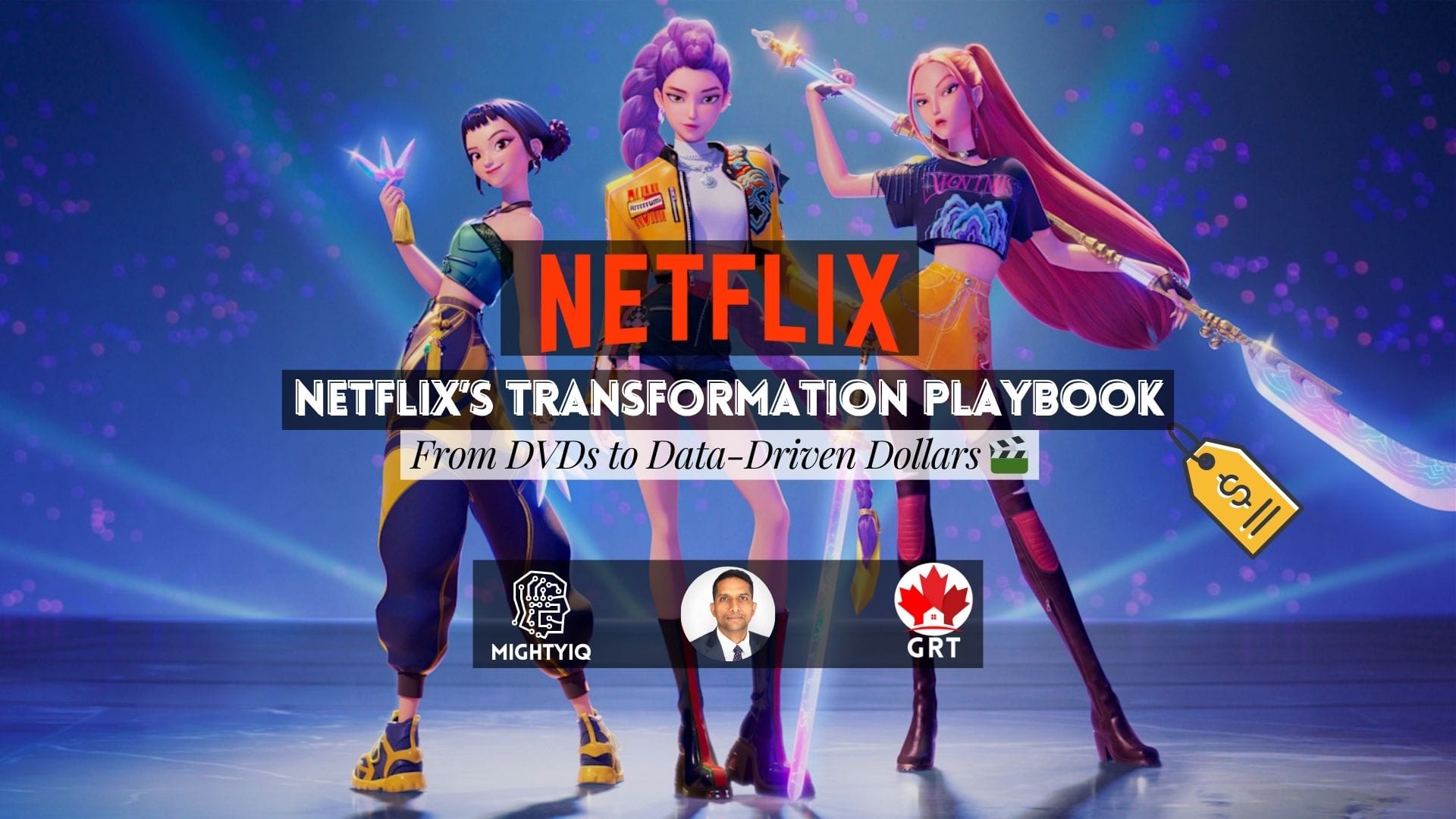🧭 Opening Play
Few companies embody transformation like Netflix.
From DVDs by mail to streaming dominance, and now to ad-powered monetization — Netflix has built its empire on the ability to reinvent before disruption hits.
In Q3 2025, that legacy of agility was once again on display.
Revenue climbed 17% year-over-year to $11.51 billion, driven by robust subscriber additions and the explosive growth of its ad-supported model. Paid users jumped 49%, marking one of its strongest quarters ever.
Yet, even amid success, the company faced turbulence: a $600 million tax charge from a Brazilian Supreme Court ruling pulled EPS down to $5.87 (vs. $7.00 expected) and sent shares sliding nearly 10%.
Still, this quarter wasn’t a setback — it was a reminder of how transformation cushions volatility.

🌍 Global Play
Netflix has always evolved with how the world watches.
In the 2000s, it reinvented movie nights — sending DVDs straight to our mailboxes when Blockbuster still ruled Friday evenings.
In the 2010s, it redefined convenience — turning streaming into a lifestyle and giving birth to the binge era.
And now, in the 2020s, Netflix is doing it again — this time by transforming how entertainment earns.
What began as a small ad-supported experiment has grown into a global growth engine.
As of May 2025, Netflix’s ad-supported tier reached over 94 million monthly active users (MAUs) — with U.S. users averaging 41 hours of viewing per month.
That’s not casual browsing — that’s commitment.
The numbers tell the story:
- High engagement → strong daily active users and longer watch times.
- Improving retention → fewer cancellations and steady churn decline.
- Rising profitability → ad revenues now account for nearly 40% of total revenue.
This hybrid model doesn’t just diversify income — it builds resilience.
When Brazil’s unexpected $600 million tax ruling hit profits, ad revenue acted as the shock absorber that kept growth steady.
Netflix has proven once again that its biggest product isn’t streaming — it’s reinvention.
⚙️ Market Reaction
The market focused on the tax-driven EPS dip, but the fundamentals tell a different story:
- Operating margins remain solid.
- Churn continues to fall.
- Ad-tier profitability improves every quarter.
Wall Street saw an earnings miss.
But Netflix saw validation of its multi-revenue playbook — one built on data, reach, and relentless reinvention.
🧩 Competitive Play
As Netflix perfects its hybrid model, another shift is underway in Hollywood — the potential Paramount–Skydance–Warner Bros. Discovery merger.
If approved, it could unite legendary franchises — Mission: Impossible, Transformers, DC Universe, and Harry Potter — under one massive studio-streaming powerhouse.
This merger could reset the rules on content exclusivity, ad pricing, and bundling power.
For Netflix, the question isn’t whether competition intensifies — it’s how it will evolve again when legacy studios consolidate.
💫 The IP Economy: Netflix’s Next Growth Engine
Beyond streaming and ads, Netflix is now turning content into culture — and culture into commerce.
The latest proof: KPop Demon Hunters.
With over 325 million views in just 91 days, it became Netflix’s most-watched film ever, alongside a #1 Billboard 200 album and 8.3 billion global streams.
Now, Netflix is deepening that success through an industry-first partnership with both Mattel Inc. and Hasbro Inc. — each serving as global co-master toy licensees.
This unprecedented collaboration will launch a global product line in 2026 — including dolls, collectibles, games, and role-play experiences — turning digital fandom into physical engagement.
It’s a bold move: Netflix is no longer just streaming culture.
It’s owning the full value chain of storytelling — from screen to shelf.
💡 Beyond Growth Takeaways
✅ Agility defines Netflix’s edge. From DVDs to streaming to ads, it has consistently reinvented its business model before disruption.
✅ Ad-tier ascendance. Now driving ~40% of total revenue, the ad-supported model is both profitable and protective.
✅ IP monetization expands reach. The KPop Demon Hunters partnerships with Mattel and Hasbro signal Netflix’s entry into global consumer products.
✅ Global tax risk is real. The $600M Brazil ruling underscores the need for regional resilience.
✅ Consolidation challenge ahead. The proposed Paramount–Skydance–Warner merger could reshape competition and redefine audience loyalty.
🔎 Final Word
Netflix’s real product isn’t entertainment — it’s reinvention.
Every time the industry matures, Netflix builds a new growth curve:
📀 DVDs — convenience redefined.
💻 Streaming — access turned into habit.
📺 Ad-tier — affordability transformed into precision monetization.
🧸 IP ecosystems — stories expanded into global products.
With 94 million ad-tier users fueling nearly 40% of total revenue, and KPop Demon Hunters evolving into a full-scale franchise through Mattel and Hasbro, Netflix has once again moved beyond content to commerce.
Its latest evolution — combining ad dominance with global licensing power — shows that Netflix isn’t waiting for the future of media.
It’s creating it, monetizing it, and then turning it into the next frontier of growth.
💬 What do you think?
Has Netflix’s latest transformation—from streaming to ad-driven growth to global IP licensing—set a new benchmark for adaptability in business?
Or is the next disruption already loading?
🤝 Let’s Collaborate
I’m a Canada-based entrepreneur and business growth consultant working where media, technology, and CPG converge.
My focus: helping companies translate innovation into sustainable growth — whether it’s a product, a platform, or a story.
What I help with:
🌍 Trade & Diversification — finding new markets, smarter routes, and building resilience beyond one region.
🛒 CPG Strategy & Insights — aligning product, pricing, and positioning with real consumer behavior.
📺 Media & Digital Platforms — FAST channels, partnerships, and monetization models that turn audiences into long-term assets.
In every industry — from wellness to entertainment — the winners aren’t just reacting to change.
They’re shaping perception, blending value with technology, and turning agility into an advantage.
🌐 Building something new?
If you’re looking for a reliable hosting provider, I’d recommend DreamHost.
We’ve used it for our client websites for over a decade — it’s fast, secure, and built for creators who want peace of mind.
🔔 Stay Connected
If this transformation story of adaptability and reinvention resonates with you, let’s keep the conversation going.
👉 Subscribe to my newsletter on entrepreneurship, media, AI, and creative growth: iamgrt.kit.com
Disclaimer: Logos, images, and references to KPop Demon Hunters are the property of Netflix and are used here for editorial purposes only.

